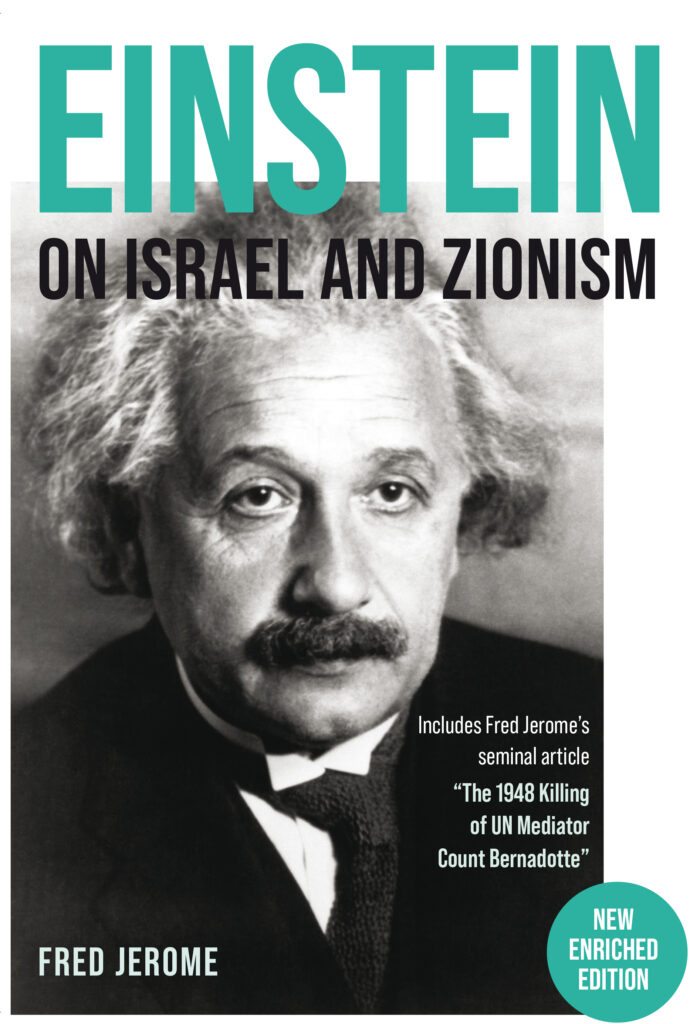Book Review by Bruce Katz*
In 2009, the late Fred Jerome** (1939-2020) published the first edition of his book, Einstein On Israel And Zionism. The book included a number of Einstein’s letters written in English, many of which reflected his views on both Israel and Zionism. Thanks to the support of Fred Jerome’s widow, Jocelyne Jerome and the Jerome family, Baraka Books has published a new enriched edition of Fred Jerome’s Einstein On Israel And Zionism.
This new enriched edition includes Fred Jerome’s seminal article on the assassination of Count Bernadotte in 1948 by the Zionist terrorists of the Stern Gang which I will also reference in this book review. Significantly, the new edition is dedicated to the memory of the late Rachel Corrie, crushed to death by an Israeli bulldozer in Gaza on March 16, 2003.
Baraka Books publisher Robin Philpot provides the following rationale for the new edition:
Fred Jerome passed away on February 1, 2020. In our last conversations, Fred expressed disappointment that Einstein’s position on Israel and Zionism was still being misinterpreted and distorted despite the publication of the first edition of Einstein on Israel and Zionism in 2009. . . The need for a new edition became particularly obvious after October 7, 2023.
In fact, Einstein’s views on Israel and Zionism were concealed and distorted for decades and still today, there are those who mistakenly believe that Einstein was in favor of a Jewish state based on the self-determination of Jews to the exclusion of the indigenous Palestinian Arabs. Einstein’s letters (some in full, others in part) as duly published show without the shadow of a doubt that while Einstein supported the idea of a Jewish “homeland” in Palestine as a refuge from the structural and pervasive antisemitism of European countries, particularly that of Germany, he demanded repeatedly in his letters equal rights and equal power for Palestinian Arabs. Moreover, Einstein did not link the idea of a homeland to Palestine; he also supported the idea of Birobidjian in the Soviet Union, Peru and China as possible places. It is my privilege to present to the readers of this book review excerpts from some of those Einstein letters which highlight both his support for a Jewish homeland in Palestine and his consistent opposition to the notion of a State for Jews only.
The book presents Einstein’s letters in distinct time periods, helpful in portraying the evolution of Einstein’s thinking on the subject of Israel and Zionism: 1919-1929, 1929-1939, 1939-1945, 1945-1948, 1948-1955. The letters constitute a reference to the manner in which Einstein’s views on Israel and Zionism have been distorted subsequent to his death. It is also this myth which the new edition deconstructs.
The Real Interest Of Great Britain In Supporting Zionism
The Balfour Declaration ‘coincided’ with the British decision in 1916—paralleling the clandestine Sykes –Picot negotiations between Great Britain and France—to take over the complete control of Palestine. (It is the opinion of the author of this book review that at the moment British industry transitioned from coal-based to oil-based energy, the British design to oust the Ottoman Empire from its position as Middle Eastern potentate took shape, and that this was one of the principal points of motivation for the British involvement in the First World War):
Arthur Balfour was Prime Minister of Great Britain from 1902-1905. It is worth noting that in 1905, the Balfour government passed the Aliens Act, which declared that “undesirable immigrants” would be denied entry to Great Britain. In real fact, although non-verbalized, these restrictions were generally levied against Jews in general and against Eastern European immigrants in particular. The 1905 Act did not discriminate against immigrants from the Indian subcontinent as their inhabitants were subjects of the British Empire. What should be understood in view of the institutional discrimination against Jews, Great Britain, like other Western nations, was not concerned about the fate of the Jews but about their own geopolitical interests. Had that not been the case, they would not have systematically barred Jews fleeing Nazi persecution from entering their respective countries during the period of the Jewish Holocaust.
An “idealistic” rationale was needed for cutting out France and the other allies from Palestine. The Zionists held the answer. If the attempt were made to impose a Jewish state on Palestine, this would predictably elicit Arab hostility which, in turn, could justify a British military peacemaker presence in Palestine. And if it happened to come to pass that a Jewish state was established in Palestine, then this, too, would serve British ends (both) as a defense of the Suez canal against (Arab) attacks . . . and as a station on the future air routes to the East.” (p.35)
Einstein was never a ‘naive’ and passive observer on the question of British imperialism in Palestine. In his testimony before the Anglo-American Committee of Inquiry on Palestine in Washington, D.C. on January 11, 1946, Einstein said the following:
“I wish to explain why I believe that the difficulties in Palestine exist. First, difficulties between the Jews and Arabs are artificially created, and are created by the English. I believe that if there would be a really honest government for the people there, there would be nothing to fear . . .
Of course, the English had two interests. The first was to have raw materials for their industry. Also the oil in those countries. . . It is my impression that Palestine is a kind of small model of India. There is an attempt, with the help of a few officials, to dominate the people of Palestine, and it seems to me that the English rule it. Palestine is absolutely of this kind . . .” (Pages 152-153)
At the same Anglo-American Committee hearing, a certain Dr. Aydelotte asked Einstein a question regarding his view “toward the idea of a political Zionism, a political Jewish state, as versus a cultural center?” Einstein’s answer was unequivocal and flies in the face of those pro-Zionist myth-makers who claim Einstein as a proponent of a Jewish state. In response to Aydelotte’s question, Einstein answered, “I was never in favor of a state.” (p. 160)
In fact, Albert Einstein’s Zionism was of a cultural nature and he consistently rejected the idea of a state exclusively for Jews to the exclusion of Palestinian Arabs. It should first be noted that Albert Einstein was not a practising Jew in a religious sense. “Irreligious is the word Einstein used to describe his parents.” (p.23) He grew up in a German Jewish middle-class family that, like most middle-class German Jews, “did its best to assimilate into German society.” (p.23) During the first forty years of Einstein’s life, “religion played little if any part in his activities.” (p.24)
Einstein first left Germany at the age of fifteen “mainly to avoid being drafted into the Prussian army” and became a Swiss citizen and finished his schooling in Switzerland. He published his general theory of relativity (E=mc2) in Berlin in 1915 and “by the age of thirty-eight had produced all of his great theories . . .” (p.24)
Subsequent to the armistice ending the First World War, there was a sharp rise in anti-Semitic attacks throughout Germany, and the government considered a proposal to “send the Jews back where they came from,” a proposal for the mass expulsion of Jews from Germany which continued into the 1930s. “Before the end of 1919, Einstein wrote to his friend Paul Ehrenfest in Holland, “Anti-Semitism is strong here and political reaction is violent.” (p.25)
In 1920, “a small group of Germans organized a series of public meetings in Berlin to denounce the theory of relativity as a “Jewish perversion” and went on to attack Einstein with thinly veiled anti-Semitic insults.” (p.27) It is within that framework of structural anti-Semitism in Germany (and elsewhere) that Einstein recognized and asserted his Jewish identity. Einstein wrote:
“East European Jews are made the scapegoats for the malaise in present-day German economic life, which is in reality a painful after-effect of the war. Opposing these unfortunate refugees, who have escaped the hell that is Eastern Europe today, has become an effective political weapon that is successfully used by demagogues.” (p.26)
(Einstein’s words highlight the present-day propensity of demagogues to target immigrants and migrants fleeing terrible living conditions for their own political ends. A number of such demagogues reside in Canada.)
It is from this perspective that Einstein’s first attraction to Zionism must be seen. Einstein himself wrote that “the torrent of German anti-Semitism at the end of the First World War not only “awakened” his “Jewish-national feelings,” but was also “my major motive for joining the Zionist movement.” (p. 28) But while initially political given the blanket anti-Semitism which characterized Western governments, including that of Canada, Einstein’s support for Zionism was of a cultural nature.
Subsequent to the 1917 Balfour Declaration, the Zionist leadership began the task of recruiting Jewish intellectuals. Einstein’s name was on the list and Zionist recruiter Kurt Blumenfeld succeeded in bringing the soon-to-become-famous scientist at least partly into the Zionist caravan.” (p. 37) At a meeting with Blumenfeld in 1919, Einstein remarked, “I am, as a human being, an opponent of nationalism. But as a Jew. I am today a supporter of the Jewish Zionist efforts.” (p. 37)
Nevertheless, Einstein’s opposition to Jewish nationalism would remain the leitmotif of his own Jewish identity throughout his lifetime, such that “Einstein’s endorsement came with a battalion of ifs and buts that made Einstein an increasingly critical “supporter.” (p.38) In effect, Blumenfeld realized that Einstein had not been really recruited. In 1921, after Blumenfeld had persuaded Einstein to accompany Chaim Weizmann to the United States, he wrote a letter to Weizmann in which he warned:
“Einstein, as you know, is no Zionist, and I ask you to not try to make him a Zionist or to try to attach him to our organization . . .Einstein, who leans to socialism, feels very involved with the cause of Jewish labor and Jewish workers . . . I heard . . .that you expect Einstein to give speeches. Please be quite careful with that. Einstein . . .often says things out of naiveté which are unwelcome to us.“
Perhaps it was Blumenfeld who was the naive one and Einstein the clever one. In fact, Einstein would go on to state a number of things which were ‘unwelcome’ to the Zionist leadership. Einstein’s mixed feelings about accompanying Chaim Weizmann to the U.S. are evident in two letters he wrote a few weeks before leaving on his trip. “On March 8, he wrote to Maurice Solovine that he was “not going entirely willingly to America” but only to help raise money for the Hebrew University, adding: “I am to play the role of a little tin god and a decoy.” (p. 44)
A day after writing the letter to Solovine, Einstein wrote to Fritz Haber the following: “Of course, they don’t need me for my abilities but only because of my name (which) they hope will have a fair amount of success with the rich kinsmen of Dollar-land.” (p. 44) The biting reference to “they” meaning the Zionist leaders, and to wealthy American Jewish-Zionists as “the rich kinsmen of Dollar-land” was far from being the endorsement of political Zionism which Blumenfeld and Weizmann were seeking.
Making The Myth
Not surprisingly, The New York Times—known for its pro-Israel bias to the exclusion of the Palestinian narrative—is a principal culprit. The gist of Einstein’s letters dismantles the myth concocted by The New York Times and other proponents of the claim about Einstein promoting the notion of Israel as an exclusive Jewish state.
“An obituary published by The New York Times on April 19, 1955, included the phrase “Israel whose establishment as a state (Einstein) had championed . . .” It was a description of Einstein the media had never used while he was alive. Then, as now, the Times was the media agenda-setter, and other newspapers and major magazines carried similar statements . . .” (page 203)
As stated clearly, had “the obituary writers simply gone to the paper’s morgue and looked through their own past stories about Einstein, what they would have found is quite different.” (page 203) In fact, Times articles from December 3, 1930, April 18, 1938 and January 12, 1946 point to Einstein’s rejection of the notion of an exclusive Jewish state (p. 204). Instead, the articles highlight Einstein’s support for a binational state which “offers ample room for Jews and Arabs (to) live side by side in peace and harmony in a common country.” (p. 204)
The New York Times has proven itself to be a purveyor of disinformation regarding Israel and the Palestinian question for decades. It is difficult not to see in the Times’ disinformation regarding Einstein the reflection of this same tendency. The front page of the Times published an article “about letters and documents newly released by Einstein’s Estate, headed, ‘The Einstein papers: A Man of Many Parts.’” The article claims that “the papers tell of his long efforts on behalf of the creation of a Jewish national state.”(p. 207)
As clarified by Fred Jerome:
“No excerpt or example from the Einstein papers is cited by the Times—nor has any been cited at any time since—to support the claim about the scientist’s ‘efforts.'” (page 207)
The following excerpts from Einstein’s letters as presented which I have chosen to cite in this book review show beyond the shadow of a doubt that the misinformation (disinformation?) propagated by the New York Times is just that.
Deconstructing The Myth
There are numerous letters written by Einstein that are openly critical of the notion of a Jewish state. Einstein supported the idea of a “Jewish homeland,” one that would be shared with the native Palestinian Arabs based on equality before the law for all and the sharing of the land. Einstein never endorsed Chaim Weizmann’s plan for a separate Jewish state but consistently spoke in favor of a bi-national Palestine.
The solution proposed by Zionist leaders, especially by Weizmann was the forced deportation of all Palestinian Arabs to Jordan (p. 71), a plan that served to raise the suspicions and ire of the Arabs toward the Zionists. “Weizmann rejected Arab proposals to negotiate as well as several proposals for a binational state or self-government in Palestine . . .” (p.71)
As the decades of the Thirties drew to a close, fighting between Arabs and Jews in Palestine intensified. Despite the on-going violence between the two communities, Einstein spelled out his own views: “There could be no greater calamity then a permanent discord between us and the Arab people . . .we must strive for a just and lasting compromise with the Arab people . . .” (p.76)
In August, 1929, Einstein writes in About Zionism:
“We Jews must show above all that our own history of suffering has given is sufficient understanding and psychological insight to know how to cope with this problem . . . Let us therefore be on our guard against blind chauvinism of any kind, and let us not imagine that reason and common-sense can be replaced by British bayonets . . . ” (p. 78)
In a letter to Hugo Bergmann dated September 27, 1929, Einstein writes:
“To me the events in Palestine seem to have proven once more how necessary it is to create a real symbiosis between Jews and Arabs in Palestine. By this I mean the existence of continuously functioning, mixed administrative, economic, and social organizations. The separate coexistence is bound from time to time to lead to dangerous tensions. In addition, all Jewish children should be obligated to learn Arabic.” (p.79)
Einstein’s proposal represents a notion diametrically opposed to that of Weizmann and other Zionist leaders.
In a letter to Weizmann dated November 25, 1929, Einstein writes: “If we are not able to find a way to honest cooperation and honest pacts with the Arabs, then we have learned nothing during our two thousand years of suffering, and deserve the fate which will befall us. Above all, in my opinion we must avoid relying too much upon the English . . .” (p.82)
On April 17, 1938, The New York Times reported on Einstein’s Address to the National Labor Committee for Palestine. The report stated:
“While urging continued effort in the upbuilding of Palestine as a Jewish homeland, he (Einstein) expressed himself as opposed to the British proposal for a division of Palestine between Jews and Arabs and the creation of a separate Jewish State. He feared that the setting up of a political Jewish State in Palestine might lead to the development of a “narrow nationalism within our own ranks, against which we have already to fight strongly even without a Jewish state.“
On April 29, 1938, Albert Einstein made what might be considered an even stronger statement against the notion of a Jewish State:
“I should much rather see reasonable agreement with the Arabs on the basis of living together in peace than the creation of a Jewish state . . . (T)he essential nature of Judaism resists the idea of a Jewish state with borders, an army, and a measure of temporal power . . .I am afraid of the inner damage Judaism will sustain . . .” (p.111)
The Revisonist Zionist movement founded by Vladimir Jabotinsky*** whose plan for a separate exclusive Jewish state was built around the precept of an Iron Wall separating Jews and Palestinian Arabs was denounced by Einstein as a party built on the notion of fascism. Menachem Begin, who would found the Likud Party, was a disciple of Jabotinsky, and the extreme-right vision of Likud has been its principle characteristic from Jabotinsky, through to Begin, Ariel Sharon and Benjamin Netanyahu. In effect, it became the triumphant form of Zionism which expresses itself today in the genocide against Palestinians in Gaza and the pogroms carried out by Jewish settlers in the occupied Palestinian West Bank. Jabotinsky and Begin are the spiritual fathers of the extreme-right zealots of the Netanyahu coalition, Itamar Ben-Gvir and Belzalil Smotrich.
Einstein’s opposition to that movement is therefore particularly significant.
“In this case, the dissidents, including Einstein, were primarily identified with what has been called cultural Zionism, emphasizing the establishment of cultural and educational centers among Jews, not a political nation with borders and therefore armies to protect the borders. The cultural Zionists advocated complete equality for Arabs and Jews, primarily through the establishment of a binational state.” (p.144)
That dream had already died even before the partitioning of Palestine in 1947.
Menachem Begin became the leader of the terrorist Irgun Zwai Leumi which fought both the British and the Palestinians. In its struggle, Irgun conducted terrorist attacks on military and civilian targets. The killing of more than 200 Palestinian men, women and children in the village of Deir Yassin in 1948 was the work of Begin and his terrorist outfit.
In 1948, subsequent to the massacre at Deir Yassin, Einstein, Hannah Arendt and other notable Jews published a letter in The New York Times (the entire letter can be read on pages 193-196) denouncing Begin—who, like his spiritual son Netanyahu, was about to visit the United States—and Begin’s party as being “closely akin in its organization, methods, political philosophy and social appeal to the Nazi and Fascist parties.” (p,145)
The very same denunciation can be made at present regarding Benjamin Netanyahu and his extreme-right coalition. They are everything that Einstein and the Jewish dissidents decried. (The late Jewish Israeli academic and intellectual, Yeshayahu Leibowitz denounced the illegal occupation of the Palestinian West Bank in stating that the chauvinism underlying the illegal occupation would result in the abandonment of Jewish traditions of humanism and result in the cult of Judeo-Nazism. His view was indeed prophetic.)
The Assassination of Count Bernadotte
Fred Jerome wrote his seminal article on the assassination of Count Folke Bernadotte in The Link. It is included in the new edition of Einstein On Israel And Zionism and is a must-read in its own right. It highlights the scope of Israeli state-sponsored terrorism which has been a leitmotif of the tradition of Revisionist Zionism from Jabotinsky onward, even before the founding of Israel in 1948.
Israel has targeted and assassinated political targets over numerous decades. These targets are sometimes individuals who, by working for peace in the Middle East, represent a threat to Israel’s ideologically-based plan for a Greater Israel, emptied of the indigenous Palestinian Arabs who have lived on the land for centuries.
Just such an individual was Count Bernadotte, a Swedish nobleman, selected as the first United Nations mediator in 1947. He was assassinated by members of the terrorist Zionist organization, Lehi, better known as the Stern Gang in 1948 on a peace-seeking mission in Palestine. In a 1952 interview, Albert Einstein said of Menachem Begin and the Stern Gang, “These people are Nazis in their thoughts and deeds.” (p.249)
In fact, Stern Gang member and terrorist, and later Prime Minister of Israel, Yitzhak Shamir sent letters to Hitler’s Third Reich in 1941 asking for an alliance with the Nazis as the means of driving the British out of the Middle East. “The establishment of the historical Jewish state on a national and totalitarian basis, and bound by a treaty with the German Reich,” the Stern document read, “offers to actively take part in the war on Germany’s side.“ It adds that “the NMO [Irgun] is closely related to the totalitarian movements of Europe in its ideology and structure“.
Count Bernadotte, as head of the Swedish Red Cross during World War Two, “succeeded in arranging the release of an estimated 20, 000-plus prisoners from Nazi concentration camps during the last year of the war. Of those released between March and May 1945, some 11, 000 were Jews who were saved through the intercession of Count Bernadotte – that according to Jeruaelm’s Yad Vashem Holocaust Museum.” (p.237-238)
The reason that the U.N. decided to send a mediator in the first place came as a result of an Israeli attack on a Palestinian village. On April 16, 1948, The New York Times reported that “a large unit of Jewish troops . . . entered the village (of Sa’sa) and began attaching TNT to the houses . . . (Commander Moshe) Kalman’s troops took the main street of the village and systematically blew up one house after another while families were still sleeping inside. . .”(p.244) Similarly, the Israeli occupation forces bombing Gaza into the stone age in 2024, specifically choose to strike Palestinian homes at night when families are together so as to kill as many of them as possible. More than 900 Palestinian families have been killed in just such a way in Gaza this year.
“On September 10, 1948, in a Tel Aviv apartment, Stern Gang leaders took the decision to kill Bernadotte. That leadership included Israel Eldad, born 1910 in western Ukraine and a close friend of Menachem Begin; Nathan Yellin-Mor, born in 1913 in what today is Belarus and who, in 1941, traveled to Turkey on behalf of the Stern Gang to try to form an alliance with the Nazis; and, most notably, the future prime minister of Israel, Yitzhak Shamir.”(p.249)
On September 17, 1948, The Stern Gang terrorists proceeded with their plan and assassinated Bernadotte, “pumping six bullets into the chest, throat and left arm” of Bernadotte, killing him and “the husband of the woman he had saved from Dachau.” (p.252)
I leave the remainder of Fred Jerome’s excellent article on the Bernadotte assassination to the reader, choosing simply to include the final lines of that article which in more ways than one show Israel exactly for what it is: a state which practices terrorism on a large scale.
“In 1991, the conspirators Israel Eldad, Meshulam Makover, and Yehusha Zeitler regaled a live TV audience on the Israeli program, “This Is Your Life,” with details of how the Stern Gang mowed down the UN’s first Mediator. We had “a weakness for the aristocracy,” quipped Eldad, to the roar of the studio audience. “You really should have seen how he would stand with his baton under his arm, “Zeitler added, giving a burlesque imitation of Bernadotte’s military posture. And when Moshe Hillman, the Israeli captain who was part of Bernadoote’s convoy said he had known of Makover’s involvement, and the show’s host asked him if he had ever told anyone, the captain replied, again to the roar of the audience, “Forty years, no!”
“Let us assume that the Klu Klux Klan lynched someone seventy years ago and this evening we watch and the surviving klansmen are there without their sheet hoods, discussing how they did it, and one says, “I kept quiet about it for forty years,’ and the audience laughs and applauds.”(p.254-255)
That is a society that calls its neighbors “human animals,” kills them by the thousands and then labels the critics of their crimes “anti-Semites,” and when that does not work, invokes the Holocaust as a last resort.
An historical document
Numerous other Einstein letters and excerpts of letters can be invoked in proving that Albert Einstein rejected with vehemence the notion of an exclusive Jewish State. I have reviewed but a scant number of them. I invite the public to purchase the book and read the letters for themselves. Given the importance of Albert Einstein both as a scientist and social critic and his pertinent views on the question of Palestine and world Jewry, this new edition of Einstein On Israel And Zionism is an important historical document.
* Bruce Katz is a founding member and current co-president of PAJU (Palestinian and Jewish Unity), a Montreal-based human rights organization now in its twenty-fourth year of existence. He has been interviewed on numerous occasions by various media on the Middle East situation.
Notes:
** Fred Jerome was a journalist, science writer, activist, and author of several books including The Einstein File, The FBI’s Secret War on the World’s Most Famous Scientist and Einstein on Israel and Zionism. Many articles and op-eds written by him appeared in numerous publications including Newsweek, The New York Times and The Link. He covered the burgeoning civil rights movement in the American south in the 1960s and taught journalism at the Columbia School of Journalism and New York University.
*** Jabotinsky was the most extreme of the early Zionist leaders, organizing the Jewish Legion, a force of 5,000 soldiers as the World Zionist Organization’s contribution to the British conquest of Palestine during World War I. In 1920, Jabotinsky organized the Haganah which, many years later, became the nucleus of the Israeli army. He founded his Revisionist Zionist organization in 1925 as the extreme-right opposition to Chaim Weizmann within the World Zionist Organization. “World Union,” founded in 1925, as the far-right opposition within the WZO to its President, Chaim Weizmann.









 (9 Nov. 2023)
(9 Nov. 2023) (Montréal, 7 septembre, 2023) – Baraka Books will launch
(Montréal, 7 septembre, 2023) – Baraka Books will launch 

Facebook